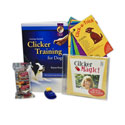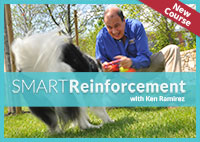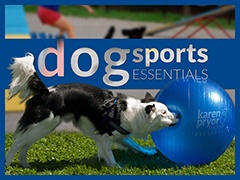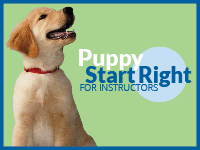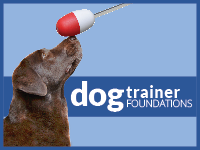Oh, my aching arm
Get your dog to walk without pulling! But how? We are masters at allowing our dogs to drag us down the street. The most asked question at obedience classes and private consultations is "how can I get my dog not to pull on his leash?"
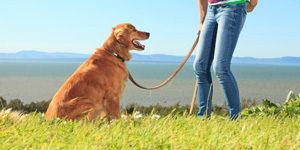
As far as dogs and leashes are concerned, we want to arrange things so that loose leashes "pay off" and tight leashes don't.
Historically trainers encouraged folks to act like a tree the moment their dog began to pull on the leash. This method does work nicely with puppies, but it just doesn't work for the adolescent or older dog who has learned to pull you around.
The following method requires first, that all or most reinforcement will come from behind you and second, that you will toss the food to the ground—not far—so the dog has to look for it.
Let's play
Loose-leash walking is going to begin as a game. Here are a few simple steps you will train BEFORE you do any walking with your dog:
- Put your dog's leash on and just stand still. When your dog releases the tension on the leash, click and show him the treat in your hand. Let him see you place the treat on the ground by the outside of your left foot. Once he's eaten the treat, move to the end of the range of the leash so it is taut and stand quietly. When he moves to release the tension, click. Show him the treat and place it by your left foot. You don't care about eye contact. What you are teaching is that releasing the leash tension gets clicked and treated. Do this a number of times.
- Continue to stand now that your dog is not pulling. Now you will click for eye contact. After the click, treat by your left foot. Remember after he has finished eating the treat to move to the end of the leash. Click and treat three times for looking at you while on a loose leash.
- Again, just standing with your dog on a loose leash, looking at you, toss your treats right past your dog's nose to about three feet away. When dog eats the treats and comes back to you looking for more, click and treat by placing the food by the outside of your left foot. Move and repeat.
- Again toss the treat right past your dog's nose. When your dog finishes eating it and turns around to come back to you, you turn your back and start walking. (Just take a few steps in the beginning.) When you dog catches up to you, but before he gets past your pant leg, click and treat. Repeat.
Note: Make sure when you toss the food it goes right past the dog's nose. This is the warm-up. Now that you have the dog following you for a few steps it is time to start walking and reinforcing behind or next to you.
Training on the move
Your dog is on leash. You turn away from him and start walking. Your dog follows. As the dog catches up to you and is coming up next to you—maybe even makes eye contact—mark (click) and drop the treat next to your left foot. Don't keep moving and be sure the first few times that you let the dog know that you have food in your hand. Once he's finished his treat, start again. Show him the treat and then turn and take a few steps away from him, walk till he catches up, drop the treat next to you or a little behind.
Start again. Begin to walk in such a way that the dog is at an angle beside you or is behind you. As the dog catches up, drop the food behind you (or next to your pant leg). Once the dog has eaten the food and is coming back toward you, start walking away from him again. Try for more steps before dropping. Timing is everything! Don't let the dog get in front of you. If he does, pivot away, wait till he catches up BUT is next to you or slightly behind you (or his nose is at your pant seam), and drop the food.
Now it's your job to increase the number of steps before dropping the food behind you. Never drop food if your dog has gotten in front of you. Work towards walking more steps before rewarding. You can vary this and reinforce while he is next to you if you wish, or toss the treat way behind you so the dog has to hunt for it and then reinforce him for catching back up to you.
Keep it up
As your dog gets better and you can now walk quite a distance without forging and pulling, don't fail to reward intermittently. For your dog to walk without pulling he has to believe (because you rewarded him) that there is a better chance of good things near you than in the wide world. Use the long line if you have to control your dog and are not taking a walk. Remember, if you never let the leash get tight, your dog won't learn that he can pull you. What he doesn't know won't hurt him or you!
There are important benefits to walking your dog—dog walkers live longer!

